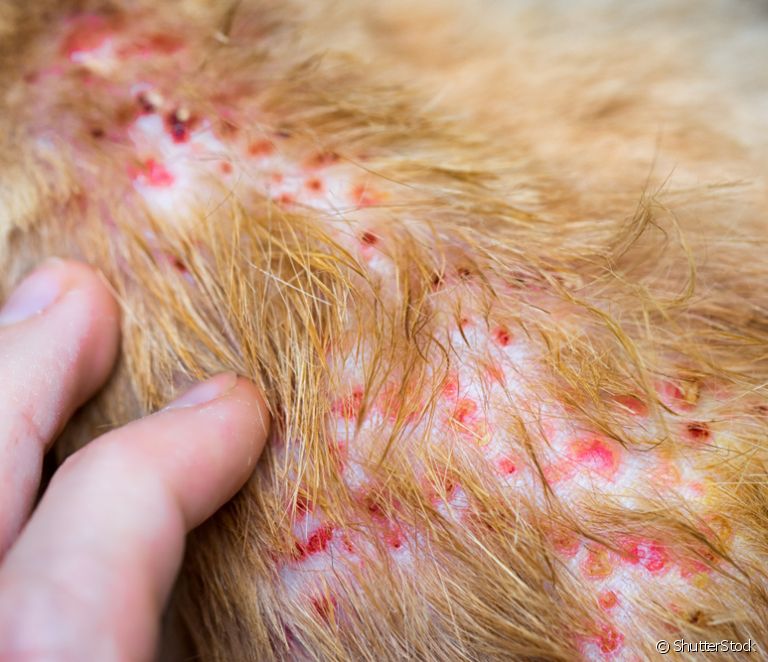Dermatitis in cats: learn more about atopy and how to treat it

Table of contents
Dermatitis in cats can be quite common. Just like dogs, felines can have allergic reactions caused by various allergens, such as pollution, dust mites, pollens, fungi and even chemicals. Atopic dermatitis in kittens is characterized by skin irritation, which can be accompanied by sores and even hair loss. Most studies indicate that the development of atopic dermatitis in cats is due tohe problem in the animal's body has a genetic factor - that is, it is passed from the female or male to the kittens. Below, learn more about dermatitis in cats and learn how to identify and how to treat the disease!
How to identify atopic dermatitis in kittens?
Intense itching is the most common sign that your cat may be having an allergic reaction, but you need to add other factors to determine a correct diagnosis, as this can indicate a number of problems. So, when you notice anything strange on your cat's body, be sure to take him to the vet for an evaluation.
The intensity of the itching can be a warning: if your kitten keeps looking for a way to relieve the discomfort, whether with his paw, teeth, tongue or rubbing himself too much on furniture and objects, it may be a case of dermatitis. With this, it is "normal" that he appears with sores or scratches on his body caused by this eternal attempt to end the itching. In addition to those already mentioned, otherssymptoms may also arise, such as:
- Otitis and other ear infections
- Hair loss (alopecia)
- Appearance of lumps on the skin
- Excessive licking of the injured area
- Red spots on paws, ears, face, armpit and belly
- Irritated skin




Dermatitis in cats: treatment is essential to control the problem
Atopic dermatitis is a problem that often recurs. After all, there is often no way to avoid the animal's contact with the allergen. The disease has no cure, but it can be controlled with the recurrent monitoring of a veterinarian. That is, it is about providing more quality of life to the animal! It is important to follow all indications for medications and feline care recommendations.
Usually, the treatment of dermatitis in cats is determined by the severity and affected areas and varies with the use of corticoids, immunotherapies or specific shampoos. It may also be necessary to make a change in your kitten's diet. Talk to your trusted veterinarian!
Dermatitis in cats: how to prevent flare-ups?
It is not always possible to contain the action of some external elements that "activate" atopic dermatitis in kittens, but you can take some steps to prevent allergy attacks. Here are some tips
Keep the environment clean at all times
Keeping the house and places where the kitten circulates always clean is the main way to prevent dermatitis in cats. Vacuum cleaners and daily cleaning can help in this control, as well as keeping the environment always ventilated. In the case of mites, you can prevent the proliferation of the environment by removing pillows, carpets and blankets from the area where the feline stays - since they are the largestaccumulators of these parasites - or use specific products to get rid of the problem. The cat's bed also needs to be made with hypoallergenic fabrics.
Avoid plants and flowers where the kitten lives
See_also: Pastordocáucaso: get to know all the characteristics of the Mastiff-type dog breed
Flower pollen is a common allergen that causes atopic dermatitis in cats, so you may want to forgo having certain plants indoors. Also, some can be extremely toxic to animals. Always research before bringing a new plant home.
See_also: Spitz-type dogs: see the breeds that belong to this categoryUse hypoallergenic cleaning products
Cats, although they love to stay in higher places, can also lie down and roll on the floor, rubbing themselves in chemicals that can trigger an allergy crisis. It is important to always choose cleaning products that are suitable for those who have pets at home. Although they are more expensive than conventional products, it is worth the investment to avoid this nuisance in the home.your pet.
Do a monthly flea and tick check on the kitten
It's important to keep your kitten's flea medication up to date, even if they don't leave the house. You can also opt for the use of specific collars to ward off parasites. In any case, talk to your vet beforehand so they can recommend the best option for an allergic animal.

